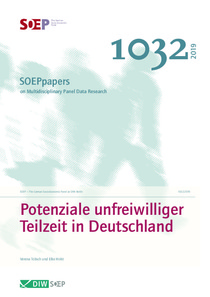Potenziale unfreiwilliger Teilzeit in Deutschland

Deutsches Institut für Wirtschaftsforschung, Berlin
DIW - Berlin
2019
55 p.
working time ; part time employment ; women workers
SOEPpapers on Multidisciplinary Panel Data Research
1032
Working time and leave
German
Bibliogr.
"Working-time political debates often focus on options for flexible and variable working hours. Meanwhile, employees' desire for more time sovereignty is gaining relevance. Although working time preferences and their impact on the German labor market are investigated in numerous studies, findings are inconsistent, varying with the data set, including the formulation and placement of questions in the underlying questionnaires. Based on the German Socio-Economic Data set (SOEP) from 2009 to 2014, this study focusses on 1) preferences for longer working hours of part-time workers; 2) preferences for shorter working hours of full-time employees; and 3) preferred working hours of currently part-time workers who have reduced their working time by at least three hours per week within the last five years. Finally, we look at possible barriers and reasons for not being able to realize individual working time preferences and present socio-demographic characteristics of an overall labor force potential based on multivariate analyses."
Digital
The ETUI is co-funded by the European Union. Views and opinions expressed are however those of the author(s) only and do not necessarily reflect those of the European Union or the ETUI.